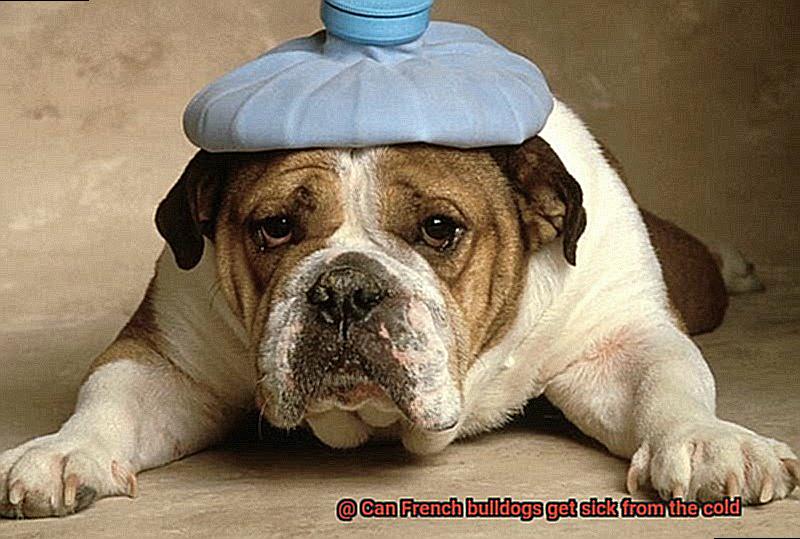Can French bulldogs get sick from the cold?
Winter is here, and as a proud owner of a French Bulldog, you might be wondering about the potential health risks that cold weather brings for your furry friend. With their cute bat-like ears and affectionate personalities, Frenchies have become beloved companions. But their unique traits make them more vulnerable to certain health issues, especially when temperatures drop.
In this blog post, we’ll dive into the possible health risks that French Bulldogs face during chilly months. While these adorable pups are generally tough and adaptable, their short coats, flat faces, and compact bodies present some challenges when it comes to handling the cold. It’s crucial for owners like us to be aware of these risks and take proactive steps to ensure our Frenchies stay healthy and comfy all winter long.
Join us as we explore how cold weather can affect French Bulldogs, including common illnesses they may experience, preventive measures we can take, and helpful tips to keep our furry pals safe from the cold’s nasty effects. Let’s prioritize their well-being by understanding the special considerations surrounding these lovable pups when winter arrives.
Can French Bulldogs Get Sick from the Cold?
Contents
- 1 Can French Bulldogs Get Sick from the Cold?
- 2 Understanding Hypothermia in French Bulldogs
- 3 Recognizing the Symptoms of Frostbite in French Bulldogs
- 4 Other Health Issues Caused by Cold Weather in French Bulldogs
- 5 How to Protect Your French Bulldog from Getting Sick in the Cold
- 5.1 Dress for Success: Outfitting Your Frenchie
- 5.2 Shelter from the Storm: Creating a Cozy Haven
- 5.3 Paw-some Protection: Guarding Against Frostbite
- 5.4 Hydration Station: The Importance of Fresh Water
- 5.5 Exercise with Care: Finding the Right Balance
- 5.6 Snow Angel or Sick Pup? Recognizing Warning Signs
- 6 Unique Considerations for Each Dog’s Tolerance to the Cold
- 7 Consulting with a Veterinarian About Your Dog’s Health
- 8 Conclusion
French Bulldogs are adorable and lovable companions, but their unique anatomy makes them more susceptible to respiratory issues caused by cold weather. As a responsible owner, it’s crucial to understand how the cold can affect your furry friend and take steps to prevent illness. In this blog post, we’ll explore why French Bulldogs can get sick from the cold and what you can do to keep them safe and cozy during colder months.
Why are French Bulldogs at Risk?
French Bulldogs belong to a brachycephalic breed, characterized by their short nose and flat face. While these features make them undeniably cute, they also make them more prone to respiratory problems. When exposed to cold temperatures, French Bulldogs may experience discomfort and even develop conditions like bronchitis or pneumonia. Additionally, if your Frenchie already has allergies or asthma, the cold weather can exacerbate these existing conditions.
Preventing Illness in the Cold
To keep your French Bulldog healthy and happy during colder months, it’s important to take precautions. Here are some steps you can take:
- Keep Them Warm: Just like humans, dogs need protection from the cold. Provide your Frenchie with a cozy and warm sleeping area indoors, away from drafts. Consider using blankets or dog beds with extra insulation.
- Dress Appropriately: French Bulldogs may benefit from wearing sweaters or jackets when venturing outside in chilly weather. These clothing items provide an extra layer of insulation and help retain body heat.
- Avoid Prolonged Exposure: While regular exercise is still important for your Frenchie’s well-being, be cautious about prolonged exposure to the cold. Keep outdoor activities short and monitor your dog for signs of discomfort.
- Watch for Warning Signs: Pay attention to any changes in your French Bulldog’s behavior or health during colder months. Signs of discomfort or illness due to the cold may include shivering, coughing, wheezing, difficulty breathing, lethargy, and decreased appetite.
- Seek Veterinary Care: If you notice any of the warning signs mentioned above, it’s crucial to seek veterinary care promptly. Early intervention can prevent conditions from worsening and ensure your Frenchie receives the necessary treatment.

Understanding Hypothermia in French Bulldogs
As responsible pet owners, it is important for us to understand the potential risks our furry friends face, especially when it comes to weather-related conditions. One such condition that can affect French Bulldogs is hypothermia – a drop in body temperature that can be quite dangerous if not recognized and treated promptly. In this section, we will explore the causes, symptoms, and treatments for hypothermia in French Bulldogs, equipping you with the knowledge you need to keep your beloved pet safe and warm.
Causes of Hypothermia in French Bulldogs
French Bulldogs are more susceptible to hypothermia due to their short coats and brachycephalic (short-nosed) anatomy. Their short coats provide less insulation against the cold, while their brachycephalic anatomy makes it more difficult for them to regulate their body temperature effectively. This combination puts them at a higher risk of developing hypothermia, especially in colder climates or during extreme weather conditions.
Symptoms of Hypothermia in French Bulldogs
Recognizing the symptoms of hypothermia in your French Bulldog is crucial for early intervention. Keep an eye out for the following signs:
- Shivering: Your French Bulldog may start shivering uncontrollably as their body attempts to generate heat.
- Lethargy: A sudden decrease in energy levels or overall sluggishness can indicate hypothermia.
- Pale gums: If your dog’s gums appear pale or bluish, it could be a sign of decreased blood flow caused by low body temperature.
- Decreased heart rate: Check your dog’s pulse – a slower-than-normal heart rate can be an indicator of hypothermia.

Preventing Hypothermia in French Bulldogs
Prevention is key when it comes to protecting your French Bulldog from hypothermia. Here are some measures you can take:
- Dress warmly: Invest in dog sweaters or coats to provide your Frenchie with an extra layer of insulation.
- Provide cozy bedding: Make sure your dog has a warm and comfortable bed or blanket to sleep on, especially during colder months.
- Limit outdoor time: Minimize your French Bulldog’s exposure to cold temperatures by keeping outdoor time to a minimum, especially during extreme weather.
Treating Hypothermia in French Bulldogs
If you suspect your French Bulldog is suffering from hypothermia, it is crucial to seek veterinary attention immediately. Your veterinarian will take the necessary steps to warm your dog up gradually and monitor their vital signs. In severe cases, intravenous fluids and other supportive treatments may be necessary.
Recognizing the Symptoms of Frostbite in French Bulldogs
As winter approaches, it’s important to keep an eye out for frostbite, a serious condition that can affect our beloved furry friends. In this guide, we’ll walk you through the symptoms of frostbite in French Bulldogs and share some tips on preventing it. So, grab a warm cup of cocoa and let’s dive in.
- Discoloration: Keep an eye out for pale, grey, or bluish skin in areas with less fur coverage like the ears, tail, paws, and nose.
- Pain and discomfort: Your French Bulldog may limp or favor the affected limb due to tissue and nerve damage. The area may feel cold to the touch, and your pup may show signs of sensitivity when examined.
- Skin changes: Frostbitten skin may develop blisters, ulcers, or become hard and stiff. In severe cases, tissues may turn black or necrotic.
Taking Action:
- Seek veterinary attention: If you suspect frostbite, don’t wait. Contact your vet immediately for a professional assessment and treatment plan.
- Slowly warm the affected area: Your vet may recommend using warm water or compresses to gradually raise the temperature. Avoid using hot water as it can worsen the condition.
- Medications and antibiotics: To prevent infection, your vet may prescribe pain medications and antibiotics.
Prevention is Key:
Time limits on outdoor play: Limit your pup’s time outside during extreme cold snaps.
Other Health Issues Caused by Cold Weather in French Bulldogs
Brrr. Winter is here, and that means chilly temperatures and icy winds. While we may bundle up in cozy coats and hats, our French Bulldogs may not be as equipped to handle the cold weather. As a French Bulldog owner, it’s important to be aware of the potential health issues that can arise in your furry friend during these colder months. So, let’s dive into some of the other health issues that French Bulldogs may face in cold weather.
- Respiratory Problems: French Bulldogs are already prone to brachycephalic airway syndrome, which can make breathing difficult. In cold temperatures, the airways can constrict even further, leading to labored breathing, coughing, and wheezing. To protect your Frenchie, limit their exposure to cold air and make sure they have a warm and cozy environment indoors.
- Dry and Itchy Skin: The combination of cold weather and low humidity can cause dry and flaky skin in French Bulldogs. This can result in itchiness, redness, and discomfort for your furry friend. To combat this issue, use a pet-friendly moisturizing shampoo and apply a veterinarian-recommended moisturizer or coconut oil to keep their skin hydrated. Limit bathing during winter months to prevent further drying.
- Joint Pain and Arthritis: Cold temperatures can worsen joint pain and arthritis in French Bulldogs. The stiffness and achiness can make it challenging for them to move comfortably. Provide extra warmth by using blankets or heating pads designed for pets. Dressing them in warm sweaters or jackets when going outside can also help.
- Weight Management: French Bulldogs have a tendency to overeat and can be less active during winter months. Monitoring their food intake is crucial to prevent weight gain, which can lead to health issues like joint problems, heart disease, and respiratory difficulties. Maintain a healthy diet for your Frenchie and find indoor activities to keep them active.
How to Protect Your French Bulldog from Getting Sick in the Cold
Winter can be a challenging time for our furry friends, especially French Bulldogs. With their short coats and compact bodies, these adorable pups are more susceptible to cold weather and its associated health risks. But fear not. By taking a few simple precautions, you can keep your French Bulldog safe, warm, and healthy all winter long.
Dress for Success: Outfitting Your Frenchie
French Bulldogs may be fashion-forward, but when it comes to winter, their wardrobe is a necessity rather than a fashion statement. Invest in a well-fitting dog sweater or coat to provide that extra layer of warmth and protection during walks and outdoor activities. Look for materials that are both cozy and water-resistant to keep your pup dry and toasty.
Shelter from the Storm: Creating a Cozy Haven
When braving the elements outdoors, it’s essential to limit your Frenchie’s exposure to extreme cold temperatures. Provide them with a warm and insulated dog house or create a cozy indoor space with blankets and heating pads. This will give them a safe retreat where they can snuggle up and stay warm.
Paw-some Protection: Guarding Against Frostbite
French Bulldogs’ paws are especially vulnerable to frostbite. Protect them from icy surfaces by using booties or applying paw wax before heading out. This will shield their precious paws from ice, snow, and harmful de-icing chemicals.
Hydration Station: The Importance of Fresh Water
Dehydration can be a concern even in cold weather. Make sure your Frenchie has access to fresh water at all times. Consider using heated bowls or regularly replacing water to prevent freezing.
Exercise with Care: Finding the Right Balance
Regular exercise is crucial for your Frenchie’s overall health, even in colder temperatures. However, be mindful of adjusting the intensity and duration of their exercise routine to accommodate the weather. Short walks and bathroom breaks are sufficient to meet their needs without exposing them to excessive cold.
Snow Angel or Sick Pup? Recognizing Warning Signs

Keep a keen eye out for signs of discomfort or illness in your French Bulldog. Shivering, lethargy, coughing, or difficulty breathing may indicate that they’re feeling the effects of the cold. If you’re concerned, consult your veterinarian promptly to ensure any health issues are addressed promptly.
Unique Considerations for Each Dog’s Tolerance to the Cold
Winter can be a challenging time for our furry friends, especially for French Bulldogs. With their short coats and thin skin, they are more susceptible to the cold than other breeds. However, with a little extra care and attention, you can ensure that your French Bulldog stays warm and cozy during the colder months.
Breed Considerations:
French Bulldogs have a short coat and thin skin, making them more sensitive to the cold. They may require additional protection such as sweaters or jackets when going outside in chilly weather. Investing in high-quality dog clothing designed for warmth and comfort can help keep your Frenchie cozy during walks or playtime.
Size Matters:
Smaller dogs, like French Bulldogs, tend to feel the cold more than larger breeds due to their higher surface-area-to-volume ratio. This means they lose heat more quickly. Ensure your Frenchie has access to warm blankets or beds indoors to snuggle up in and stay warm.
Age and Health Considerations:
Puppies and older dogs are more vulnerable to the cold as their immune systems may not be as strong. They may also have difficulty regulating their body temperature, making them prone to hypothermia or frostbite. Keep a close eye on them when outdoors and limit exposure to chilly temperatures.
Signs of Discomfort:
It’s important to pay attention to your Frenchie’s behavior when out in the cold. Look for signs of discomfort such as shivering, lifting paws off the ground, reluctance to walk, or seeking warmth. If you notice any of these signs, bring your dog indoors immediately.
Protecting Paws:
Cold surfaces can be harsh on your Frenchie’s paws, potentially causing frostbite or discomfort. Use paw wax or protective booties to shield their paws from icy surfaces during walks. Wipe their paws after being outdoors to remove any salt or de-icing chemicals that can irritate their skin.
Hydration:
Remember to keep your Frenchie hydrated, even during colder months. Dehydration can occur in cold weather too, so always provide fresh water for your dog.
Adjust Exercise Routines:
During extremely cold temperatures, it’s best to shorten your Frenchie’s outdoor exercise sessions. Supplement their exercise routine with mental stimulation activities indoors, such as puzzle toys or training sessions.
Consulting with a Veterinarian About Your Dog’s Health
To ensure their well-being and comfort during colder temperatures, it is crucial to consult with a veterinarian. In this blog post, we will explore the importance of consulting with a veterinarian and the valuable insights they can provide to help protect your French bulldog from cold-related illnesses.
The role of a veterinarian in your dog’s overall health:
- Veterinarians possess the knowledge, expertise, and experience necessary to assess your French bulldog’s overall health.
- Regular check-ups with a veterinarian are essential for detecting and addressing any underlying health issues before they become severe.
Discussing cold weather concerns with your veterinarian:
- Communicate any concerns you may have about your French bulldog’s ability to tolerate the cold.
- The veterinarian will ask questions about your dog’s daily routine, exercise habits, and any noticeable changes in behavior or health during colder temperatures.
Physical examination:
- During the consultation, the veterinarian may conduct a physical examination to assess your dog’s overall health.
- They will examine your dog’s coat, skin condition, weight, and body condition to identify any underlying health issues that may make them more susceptible to cold-related illnesses.
Guidance on acclimating your French bulldog to colder temperatures:
- Veterinarians can provide valuable advice on how to properly acclimate your French bulldog to colder temperatures.
- They may recommend measures such as warm clothing, limiting outdoor exposure during extreme cold conditions, and appropriate diet adjustments or supplements.
Understanding the risks specific to French bulldogs in cold weather:
- Due to their short coats and brachycephalic features, French bulldogs are more prone to cold-related health issues such as hypothermia and frostbite.
- Consulting with a veterinarian can help you understand the specific risks your French bulldog may face and take appropriate precautions to keep them safe.
Em5WE9QFfa0″ >
Conclusion
In conclusion, the cold can indeed pose a threat to French Bulldogs, given their unique anatomy and susceptibility to respiratory issues. With their short coats, flat faces, and compact bodies, these adorable pups are more prone to conditions like bronchitis, pneumonia, hypothermia, frostbite, dry skin, joint pain, and even unwanted weight gain during colder months.
To shield your furry friend from falling ill in chilly temperatures, it is crucial to be proactive. Create a warm sanctuary for them indoors away from pesky drafts. Consider providing cozy blankets or dog beds with extra insulation for added comfort. And when venturing outside into the brisk weather, dress them appropriately with fashionable sweaters or jackets that provide an extra layer of protection against the cold. Remember: fashion can also be functional.
Avoid subjecting your French Bulldog to prolonged exposure to the cold and keep a watchful eye for any signs of discomfort or illness. Shivering? Coughing? Wheezing? Difficulty breathing? Lethargy? Decreased appetite? These are all red flags that warrant immediate veterinary care. Swift action can prevent conditions from worsening and ensure your Frenchie receives the necessary treatment.
It’s important to note that each dog’s tolerance to the cold may vary based on factors such as breed considerations (think short coat and thin skin), size (smaller dogs feel the chill more intensely), age (puppies and older dogs are more vulnerable), and overall health. Seeking advice from a trusted veterinarian is essential in understanding your pup’s specific needs and gaining valuable insights on how best to protect them from cold-related illnesses.
By taking these precautions and consulting with a veterinarian when necessary, you can keep your French Bulldog safe and snug throughout the winter season.




